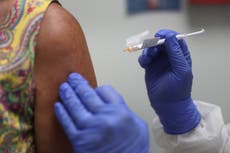The Independent's journalism is supported by our readers. When you purchase through links on our site, we may earn commission.
Covid vaccine: People in UK could get Pfizer jab by mid-December, says professor
UK set to receive 10 million doses of Pfizer/BioNTech vaccine by end of year
Your support helps us to tell the story
From reproductive rights to climate change to Big Tech, The Independent is on the ground when the story is developing. Whether it's investigating the financials of Elon Musk's pro-Trump PAC or producing our latest documentary, 'The A Word', which shines a light on the American women fighting for reproductive rights, we know how important it is to parse out the facts from the messaging.
At such a critical moment in US history, we need reporters on the ground. Your donation allows us to keep sending journalists to speak to both sides of the story.
The Independent is trusted by Americans across the entire political spectrum. And unlike many other quality news outlets, we choose not to lock Americans out of our reporting and analysis with paywalls. We believe quality journalism should be available to everyone, paid for by those who can afford it.
Your support makes all the difference.The scientist behind the Pfizer/BioNTech vaccine has said that people in the UK could start to receive jabs by the middle of next month.
Professor Ugur Sahin, the co-founder of German firm BioNTech, which developed the vaccine before licensing it to Pfizer, said this would depend on when approval is granted by the UK’s regulatory authorities.
However, he warned that the arrival of his vaccine “will not mean the situation will dramatically change” by the end of the year.
"This will be a difficult winter,” he told Sky News. “It will become worse before it becomes better."
With the help of the vaccine, Prof Sahin predicted that life could return to normal “by the middle of next year” — a similar forecast made by other vaccinologists.
He said he was surprised that his vaccine had been proven to be 90 per cent effective in preventing disease, describing this as an “outstanding result”.
"We don't expect that, as serious scientists, we consider potential efficacy between 60, 70 and 80 per cent,” he said.
Germany's Robert Koch institute for infectious diseases (RKI) has meanwhile said that preliminary data from the vaccine are very encouraging.
The jab has been tested on 43,500 people in six countries across the world.
Its efficacy rate is based on preliminary analysis, conducted by an independent data monitoring board, that looked at 94 infections recorded so far in Pfizer’s ongoing phase three study.
The firm said it will continue to run the trial until this figure rises to 164, at which point it will present all its findings to the regulatory authorities in each country.
The UK government has ordered 40 million doses of the Pfizer candidate, 10 million of which are due to be delivered by the end of the year if approval is granted, Downing Street said earlier this week.
Protection is achieved 28 days after the initiation of the vaccination, which consists of two doses, meaning up to five million people in the UK could be inoculated over the winter period.
“I am hopeful, but not yet certain, that we could begin to see some vaccines by Christmas,” said England’s deputy chief medical officer Jonathan Van-Tam on Monday.
Experts have warned, though, that authorities face a significant challenge in storing and distributing doses of the vaccine.
The vaccine needs to be kept at -70C up until the day it is used to maintain the integrity of the doses’ genetic material.
This is expected to complicate the rollout of doses to GP clinics and care homes, which do not have the refrigerator technology required to maintain such low temperatures.
Professor Sahin said that while the world waits for safety checks and government authorisations, people should continue to wear masks and maintain social distancing.
"Everyone has a responsibility. It's not just about governments. The most important aspect is to carry a mask, be careful and avoid too many people being too long in one room."
Asked whether he felt under pressure to deliver a successful vaccine, as other teams worked on their own candidates, he said: "Of course. But it's not a race against each other, it's a race against time."



Join our commenting forum
Join thought-provoking conversations, follow other Independent readers and see their replies
0Comments